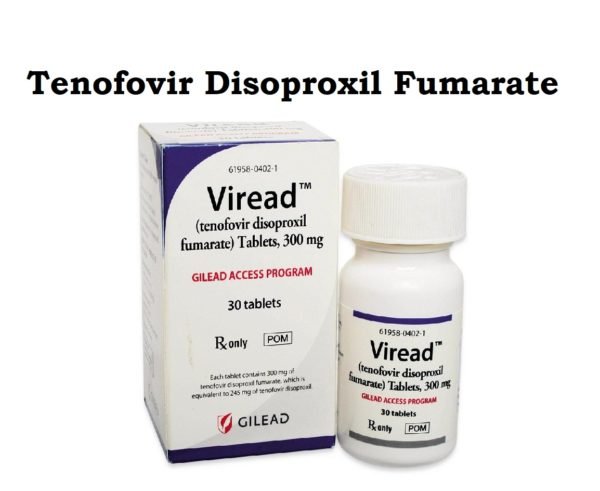Tenofovir Disoproxil Fumarate is an antiviral drug that is used to treat patients with chronic Hepatitis B and HIV infections.
Indications of Tenofovir:
-
Chronic hepatitis B:
- It is used for the treatment of chronic hepatitis B virus in patients ≥2 years of age weighing ≥10 kg.
-
Treatment of HIV-1 infection:
- It is indicated for the treatment of HIV-1 infection in patients ≥2 years of age weighing ≥10 kg, in combination with other antiretroviral agents.
-
Off Label Use of Tenofovir disoproxil fumarate in Adults:
- HIV-1 nonoccupational postexposure prophylaxis; HIV-1 occupational postexposure prophylaxis.
Tenofovir disoproxil fumarate dose in Adults
-
Hepatitis B infection:
- 300 mg per oral once daily.
-
Treatment duration:
- Tenofovir is influenced by HBeAg status, duration of HBV suppression, and presence of cirrhosis/decompensation.
Tenofovir Disoproxil Fumarate use in patients without cirrhosis:
-
Hepatitis B e antigen-positive immune-active chronic hepatitis:
- The duration of therapy is generally a minimum of 12 months of persistently normal ALT and undetectable serum HBV DNA levels after HBeAg seroconversion
-
HBeAg-negative immune-active chronic hepatitis:
- Duration of therapy is indefinite, discontinuation may be considered in patients with loss of HBsAg.
Tenofovir Disoproxil Fumarate in Patients with Cirrhosis:
-
HBeAg-positive immune-active chronic hepatitis:
- Treatment should be continued indefinitely in seroconversion unless there is a strong reason for discontinuation.
-
HBeAg-negative immune-active chronic hepatitis:
- Treatment discontinuation is not recommended due to the potential for decompensation and death.
Tenofovir Disoproxil Fumarate Dose in HIV-1 infection:
-
Treatment:
- 300 mg per oral once-daily concurrently with other antiretrovirals.
-
HIV-1 nonoccupational postexposure prophylaxis (off-label use):
- 300 mg per oral once daily for 28 days concurrently with other antiretroviral agents.
- Therapy should be started within 72 hours of exposure.
-
HIV-1 occupational postexposure, prophylaxis (off-label use):
- 300 mg per oral once daily in combination with emtricitabine and raltegravir.
- Therapy should be started within 72 hours and continued for one month.
Tenofovir Disoproxil Fumarate Dose in Children:
Tenofovir Disoproxil Fumarate Dose in HIV-1 infection:
-
Treatment - Weight-directed dosing:
- Children ≥2 years weighing ≥10 kg and Adolescents: 8 mg/kg per oral once daily
- maximum daily dose: 300 mg/day
-
Dosage form specific fixed dosing:
- Oral powder: Children ≥2 years weighing ≥10 kg and Adolescents:
Note: Only measure with the provided scoop. One level scoop = 40 mg tenofovir disoproxil fumarate
-
10 to <12 kg:
- 80 mg (2 scoops)per oral once daily
-
12 to <14 kg:
- 100 mg (2.5 scoops) per oral once daily
-
14 to <17 kg:
- 120 mg (3 scoops) per oral once daily
-
17 to <19 kg:
- 140 mg (3.5 scoops) per oral once daily
-
19 to <22 kg:
- 160 mg (4 scoops) per oral once daily
-
22 to <24 kg:
- 180 mg (4.5 scoops) per oral once daily
-
24 to <27 kg:
- 200 mg (5 scoops) per oral once daily
-
27 to <29 kg:
- 220 mg (5.5 scoops)per oral once daily
-
29 to <32 kg:
- 240 mg (6 scoops) per oral once daily
-
32 to <34 kg:
- 260 mg (6.5 scoops) per oral once daily
-
34 to <35 kg:
- 280 mg (7 scoops) per oral once daily
-
≥35 kg:
- 300 mg (7.5 scoops)per oral once daily
-
Oral tablets: Children ≥2 years weighing ≥17 kg and Adolescents:
-
17 to <22 kg:
- 150 mg once daily
-
22 to <28 kg:
- 200 mg once daily
-
28 to <35 kg:
- 250 mg once daily
-
≥35 kg:
- 300 mg once daily
-
-
HIV-1 nonoccupational postexposure prophylaxis:
-
Children ≥2 years:
- Oral: Age- and weight-appropriate dosing (see HIV-1 infection, treatment above) for 28 days in combination with other antiretroviral agents.
- Initiate therapy within 72 hours of exposure.
-
Adolescents:
- The combination product is recommended (see Emtricitabine and Tenofovir Disoproxil Fumarate monograph)
-
Tenofovir Disoproxil Fumarate dose in the treatment of Chronic Hepatitis B infection:
-
Children ≥2 years weighing ≥10 kg and Adolescents:
- 8 mg/kg per oral once daily
- The maximum daily dose: 300 mg/day
Pregnancy Risk Category: B
- Tenofovir can cross the human placenta, increasing the risk of stillbirth, preterm delivery, low birth weight and small for gestational infants.
- If viral suppression is successful and the regimen is well tolerated, Tenofovir may be continued during pregnancy.
- It should be administered postpartum, with dose modification in HIV.
- It can be administered at 28-32 weeks gestation, and stopped between 1 and 3 months after delivery. Continuous monitoring of ALT is recommended.
- Infants who have been exposed to antiretroviral medication should be followed up for a long time.
- Children with heart or CNS abnormalities and children with mitochondrial dysfunction should also be evaluated.
- Mothers who gave birth to tenofovir disoproxil fumarate during pregnancy could have lactic acidosis or hepatic steroids, and decreased bone mineral content.
Tenofovir disoproxil fumarate use during breastfeeding:
- Tenofovir can be excreted in milk but is not recommended for acute HIV infection in breastfeeding women.
- If the infection is confirmed, breastfeeding should be stopped.
- Postnatal HIV transmission is still possible even with maternal antiretroviral treatment.
- Besides, a multi-class-resistant virus has been detected in breastfeeding infants despite maternal therapy.
Tenofovir Disoproxil Fumarate Dose adjustment in renal disease:
-
Manufacturer's labeling:
-
Creatinine clearance ≥50 mL/minute:
- No dosage adjustment necessary.
-
Creatinine clearance 30 to 49 mL/minute:
- 300 mg every 48 hours
-
Creatinine clearance 10 to 29 mL/minute:
- 300 mg every 72 to 96 hours
-
Creatinine clearance <10 mL/minute:
- There are no dosage adjustments provided in the manufacturer's labeling.
-
Hemodialysis:
- 300 mg following dialysis every 7 days or after a total of 12 hours of dialysis (usually once weekly assuming 3 dialysis sessions lasting about 4 hours each).
-
-
Alternate recommendations (IDSA):
-
Creatinine clearance <50 mL/minute (and not on hemodialysis) or GFR <60 mL/minute/1.73 m²:
- Avoid use.
-
Peritoneal dialysis:
- Use with caution; dose reduction recommended.
-
Tenofovir Disoproxil Fumarate Dose adjustment in liver disease:
No dosage adjustment is necessary.
Common Side Effects of Tenofovir Disoproxil Fumarate:
-
Central Nervous System:
- Insomnia
- Headache
- Pain
- Dizziness
- Depression
-
Dermatologic:
- Skin Rash
- Pruritus
-
Endocrine & Metabolic:
- Hypercholesterolemia
- Increased Serum Triglycerides
-
Gastrointestinal:
- Abdominal Pain
- Nausea
- Diarrhea
- Vomiting
-
Neuromuscular & Skeletal:
- Decreased Bone Mineral Density
- Increased Creatine Phosphokinase
- Weakness
-
Miscellaneous:
- Fever
Rare Side Effects of Tenofovir Disoproxil Fumarate:
-
Cardiovascular:
- Chest Pain
-
Central Nervous System:
- Fatigue
- Anxiety
- Peripheral Neuropathy
-
Dermatologic:
- Diaphoresis
-
Endocrine & Metabolic:
- Weight Loss
- Glycosuria
- Hyperglycemia
- Lipodystrophy
-
Gastrointestinal:
- Increased Serum Amylase
- Anorexia
- Dyspepsia
- Flatulence
-
Genitourinary:
- Hematuria
-
Hematologic & Oncologic:
- Neutropenia
-
Hepatic:
- Increased Serum ALT
- Increased Serum AST
- Increased Serum Transaminases
- Increased Serum Alkaline Phosphatase
-
Neuromuscular & Skeletal:
- Back Pain
- Arthralgia
- Myalgia
-
Renal:
- Increased Serum Creatinine
- Renal Failure
-
Respiratory:
- Sinusitis
- Upper Respiratory Tract Infection
- Nasopharyngitis
- Pneumonia
Contraindication to Tenofovir Disoproxil Fumarate:
Hypersensitivity to tenofovir and any component of the formulation
Warnings and precautions
-
Reduced bone mineral density
- Tenofovir has been associated with decreases in bone mineral density and increased serum parathyroid hormone and 1,25 vitamin D levels in adults and children were also higher.
- Supplementation with Vitamin D and calcium should be provided. It is also important to monitor bone density in adults and children who have had a history of fractures.
-
Immune reconstitution syndrome:
- Immune reconstitution syndrome can occur in patients who have an inflammatory response to residual HIV infection.
- Patients may also develop autoimmune disorders like Graves' disease or polymyositis later in therapy.
-
Lactic acidosis/ hepatomegaly:
- Life-threatening conditions include severe hepatomegaly and lactic acidosis.
-
Osteomalacia, renal dysfunction
- Osteomalacia may be caused by proximal renal tubeopathy. This can manifest as bone pain, extreme pain, fractures and weakness.
-
Toxicity in the renal system:
- May cause renal toxicity such as acute renal failure and/or Fanconi syndrome and the risk factor is increased with NSAIDs.
- Guidelines from IDSA recommend replacing tenofovir by alternate therapy for HIV-infected persons with a >25% decrease of GFR from baseline.
- This includes a level of 60mL/minute/1.73m2 during treatment, as well as euglycemic, increased urinary and phosphorus excretion, hypophosphatemia and proteinuria.
-
Chronic Hepatitis B: [US-Boxed Warning]
- Hepatitis B exacerbation may occur after treatment has been stopped.
- This can lead to hepatic dysfunction and hepatic failure in patients with advanced hepatic diseases or cirrhosis.
- After stopping therapy, LFTs should continue to be monitored for longer periods.
Monitoring parameters:
- CBC
- LFTS
- RFTS
- Creatinine kinase
- Urine glucose and protein
- Serum phosphorus
- CD4 count/HIV RNA levels
- bone density
- testing for HBV
- HIV status
How to administer Tenofovir disoproxil fumarate (Viread)?
- Tablets can be given without regard to food.
- The powder should be mixed with 2 to 4 ounces of soft food (applesauce, baby food, yogurt) and swallowed immediately, do not mix in liquid (powder may float on top of the liquid even after stirring).
- The powder should be measured using only the supplied dosing scoop.
Mechanism of action of Tenofovir disoproxil fumarate:
- Tenofovir diproxil fumarate, also known as TDF, is a nucletide reverse transcriptase inhibitor.
- It is analogous to adenosine 5’-monophosphate. It inhibits viral replication by interfering the HIV viral DNA dependent polymerase.
- Hydrolysis converts tenofovir disoproxil fumarate to tenofovir, and then phosphorylates it to the active form of tenofovir. Tenofovir inhibits HBV replication by inhibiting HBV polymerase.
Protein binding:
- <7% to serum proteins
Metabolism:
- Tenofovir disoproxil fumarate (TDF) is converted intracellularly by hydrolysis (by non-CYP enzymes) to tenofovir, then phosphorylated to the active tenofovir diphosphate
Bioavailability:
- Tablets: ~25% (fasting); increases ~40% with high-fat meal
- Powder: Peak serum concentrations are 26% lower compared to the tablet, but the mean AUCs are similar
Half-life elimination:
- Serum: 17 hours
- intracellular: 10 to 50 hours
Time to peak serum concentration:
- Fasting: 36 to 84 minutes
- With high-fat meal: 96 to 144 minutes
Excretion:
- Urine (70% to 80%) via filtration and active secretion, primarily as unchanged tenofovir within 72 hours; after multiple oral doses (administered with food): 32% ± 10% is excreted in the urine within 24 hours
Clearance:
- Total body clearance is decreased in patients with renal impairment
Tenofovir disoproxil fumarate Brand Names (International):
- APO-Tenofovir
- Auro-Tenofovir
- JAMP-Tenofovir
- MYLAN-Tenofovir Disoproxil
- NAT-Tenofovir
- PMSTenofovir
- TEVA-Tenofovir
- Viread
- Dipovir
- Forvic
- Foviral
- Glonovir
- Ricovir
- Tefostad T300
- Tenof
- Tenofir
- Tenofo-B
- Tenolam
- Tenozet
- Tenvir
- Tenvira
- Tenvor
- Viraday
- Viread
- Xynovir
Tenofovir disoproxil fumarate Brand Names in Pakistan:
Brands in Pakistan will be updated later.


 Injection for familial chylomicronemia syndrome.jpeg)

